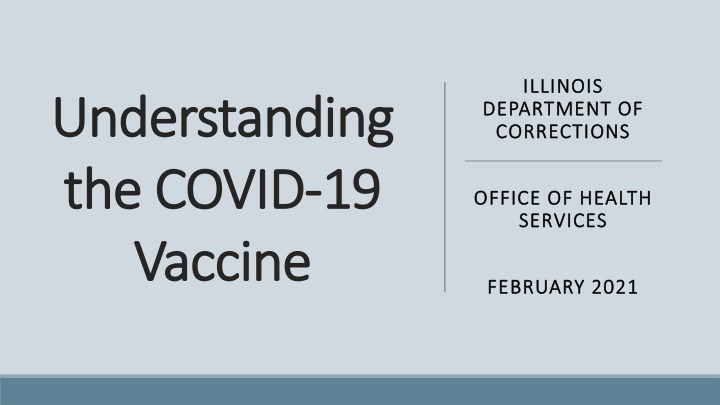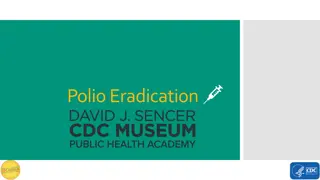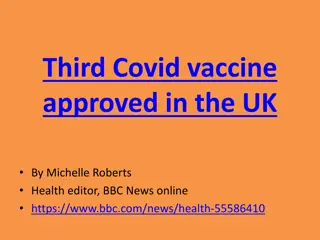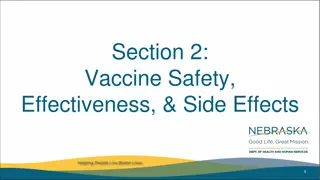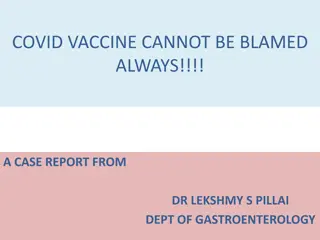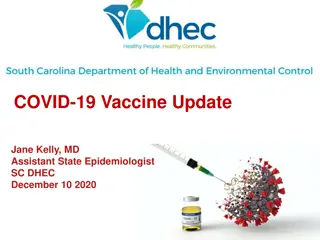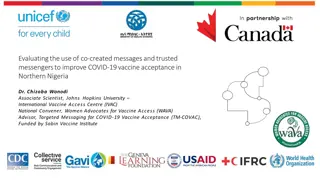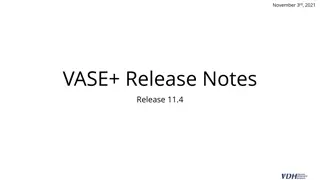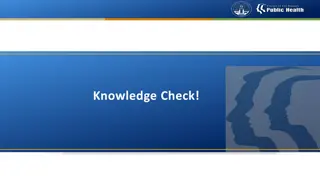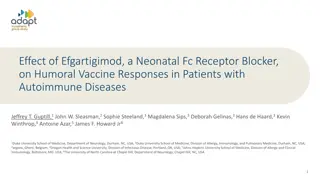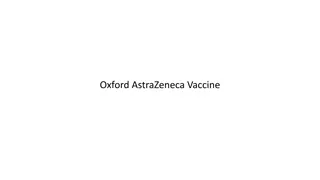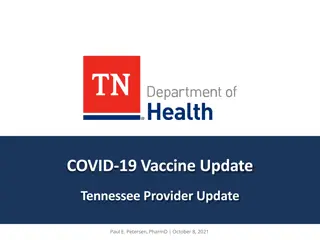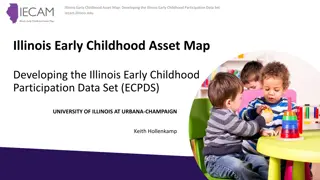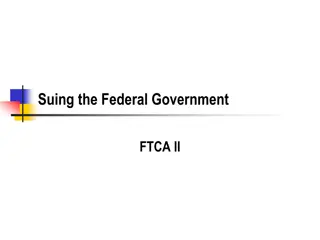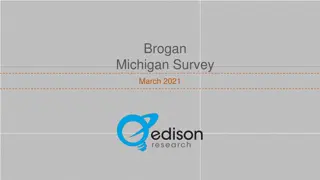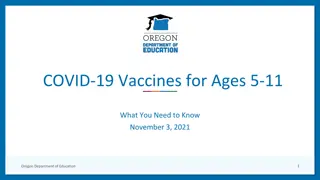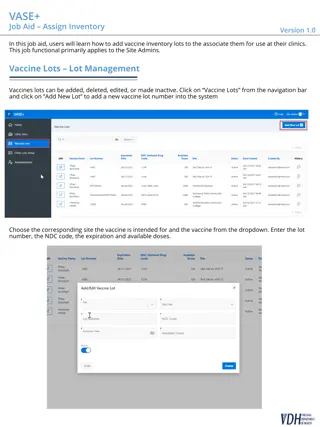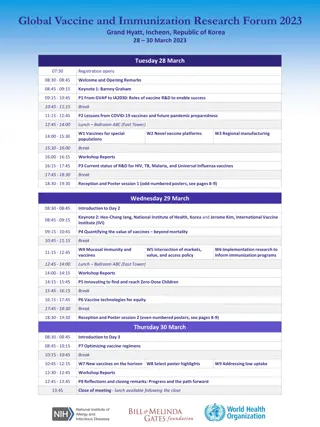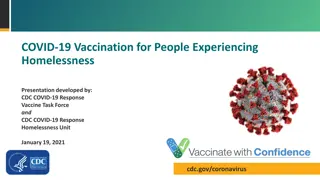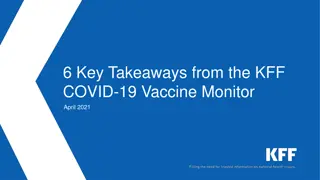Understanding the COVID-19 Vaccine: Information from Illinois Department of Corrections
The Illinois Department of Corrections emphasizes the importance of the COVID-19 vaccine, highlighting its effectiveness in preventing severe illness. Individuals are encouraged to make an informed decision about vaccination, ensuring protection for themselves and others. The department assures that no disciplinary action will be taken for declining the vaccine. It addresses disparities in infection rates among communities of color and urges vaccination in high-risk groups. The content emphasizes the role of health experts and the CDC in promoting vaccine uptake.
Download Presentation

Please find below an Image/Link to download the presentation.
The content on the website is provided AS IS for your information and personal use only. It may not be sold, licensed, or shared on other websites without obtaining consent from the author.If you encounter any issues during the download, it is possible that the publisher has removed the file from their server.
You are allowed to download the files provided on this website for personal or commercial use, subject to the condition that they are used lawfully. All files are the property of their respective owners.
The content on the website is provided AS IS for your information and personal use only. It may not be sold, licensed, or shared on other websites without obtaining consent from the author.
E N D
Presentation Transcript
ILLINOIS ILLINOIS DEPARTMENT OF DEPARTMENT OF CORRECTIONS CORRECTIONS Understanding Understanding the COVID the COVID- -19 Vaccine Vaccine 19 OFFICE OF HEALTH OFFICE OF HEALTH SERVICES SERVICES FEBRUARY 2021 FEBRUARY 2021
The COVID-19 vaccine is 95% effective in preventing severe or symptomatic disease which can keep you healthy and alive.
The vaccine will help the world develop immunity to bring an end to the disease.
YOU get to decide whether you want the COVID-19 vaccine to protect yourself and those around you.
You will not be disciplined if you say no.
The COVID-19 vaccines are not developed by the state or IDOC.
They are the same vaccines that staff and communities on the outside will be getting.
The Centers for Disease Control (CDC) reports increasing evidence that communities of color are experiencing higher infection rates.
Contributing factors include access to health care, the rate of uninsured people, occupational hazards related to essential worker status, housing conditions and racial discrimination.
Health experts are encouraging those in Black, LatinX and Asian-American communities to get vaccinated, as they are all classified as having a large share of high-risk individuals.
The Centers for Disease Control says that while the vaccine is 95% effective in helping you stay well, they still do not know if it will prevent you or others from passing the virus along to another person.
Illinois Department of Public Health Director Dr. Ngozi Ezike receives her first dose of the COVID-19 vaccine on January 12, 2021.
FREQUENTLY FREQUENTLY ASKED QUESTIONS ASKED QUESTIONS
Is the COVID Is the COVID- -19 vaccination vaccination 19 YES! safe? safe?
In the United States, the vaccines being used now have gone through large clinical trials.
In addition, the CDC is monitoring the safety of vaccines that have been given to Americans over the past weeks.
Millions of people have been vaccinated already and serious side effects are rare. Should I Should I worry about worry about side effects? side effects?
There can be pain in the upper arm, fatigue, headache, and in a small number of cases, fever or chills.
Side effects are generally resolved within 48 hours.
These side effects are a sign of an immune system kicking into gear. They do not signal that the vaccine is unsafe.
There is not yet enough vaccine to go around. Illinois has set priorities as to who needs the vaccine the most. When can I When can I get get vaccinated? vaccinated?
In the first phase, medical staff are at the top of the list.
Later in the first phase, corrections staff and incarcerated people have been identified as a priority.
People who value your health and safety fought for incarcerated people to be included in Phase 1 because it is important.
Illinois is prioritizing prisoners among direct care providers, schoolteachers and correctional staff!
Most people in the state will not get the vaccine until everyone in the first phase, including you, have been given the chance to get it.
That is because people who live in shared spaces like nursing homes, prisons, and veterans' centers are at higher risk.
IDOC anticipates vaccinations will begin in correctional facilities in February.
We will first be conducting a survey to determine how many of you are interested in taking it.
Vaccinations will be administered by either medical technicians with the Illinois National Guard or healthcare workers from the Illinois Department of Public Health.
You will be notified when a vaccination schedule has been determined for your facility.
The vaccine will be provided at no cost. How much How much will I have to will I have to pay for the pay for the vaccine? vaccine?
It will take 10 to 14 days for your body to build immunity after the first dose. The second dose increases your immunity further. How long will How long will it take for me it take for me to be to be protected? protected?
No. Even though the vaccine was developed quickly, governments around the world allocated funding to support vaccine research and collaboration among experts in the medical community. Was the Was the development development of this of this vaccine vaccine rushed? rushed?
The vaccine was still subjected to the same testing that all vaccines must complete to make sure they are safe and effective.
You will still need to wear your mask and social distance for the foreseeable future. Do I need to Do I need to wear a mask wear a mask after being after being vaccinated? vaccinated?
Does the new Does the new vaccine vaccine contain any contain any COVID COVID- -19 The COVID-19 vaccination does NOT have any virus present. 19 virus? virus?
How long will How long will my immunity my immunity last after the last after the vaccination? vaccination? Studies are underway to determine how long immunity lasts.
There is a new strain that is more infectious, and cases have been confined in Illinois as of January 15. Are there new Are there new strains of the strains of the COVID COVID- -19 19 virus? virus?
Health officials say that the strain does not make people sicker, but it does increase risk of death.
Officials also say the vaccine should protect people from this new strain, but more study is underway.
Will the Will the COVID COVID- -19 vaccine cause vaccine cause me to test me to test positive for positive for COVID COVID- -19? 19 COVID-19 vaccines will not cause a positive test result. 19?
People who have gotten sick with COVID-19 may still benefit from getting vaccinated. Should I get Should I get vaccinated if I vaccinated if I have already have already had COVID had COVID- -19? 19?
You can be vaccinated as soon as 14 days after testing positive for COVID-19.
I have severe I have severe medication or medication or food allergies. food allergies. May I take May I take People with severe allergies should talk with a physician first. this this vaccination? vaccination?
Reach out to healthcare staff to discuss your health care needs.
No. According to the National Society of Genetic Counselors, the genetic material in the vaccines is called mRNA, and it is different from DNA. Will the Will the COVID COVID- -19 vaccine vaccine change my change my 19 DNA? DNA?
Rumors on the Internet about the vaccine changing DNA have been proven false by trusted sources.
The vaccine is equally effective across different ethnic and racial groups. Will this Will this vaccination vaccination work for all work for all ages, races ages, races and and ethnicities? ethnicities?
Its effectiveness is slightly lower in people 65 and older.
